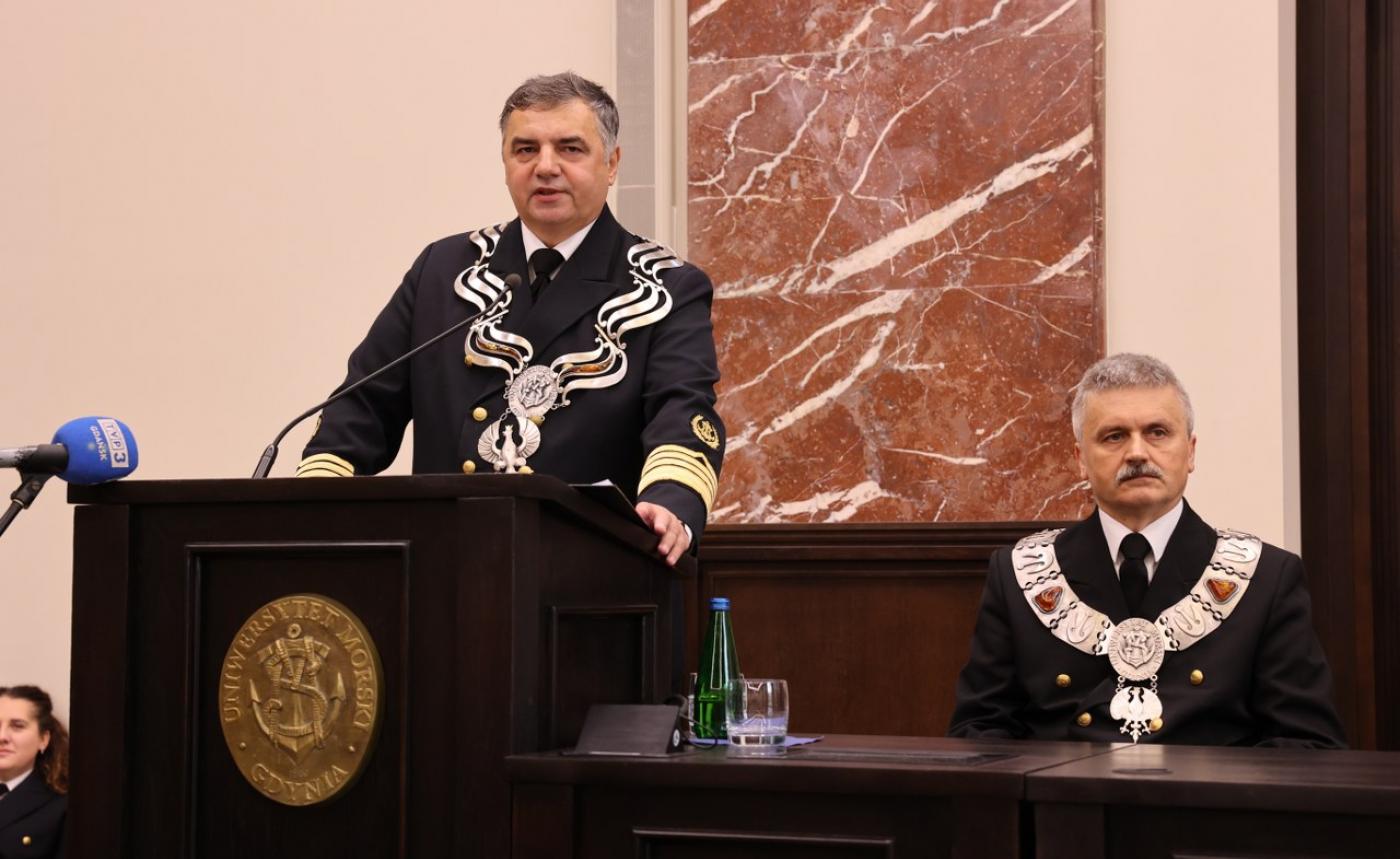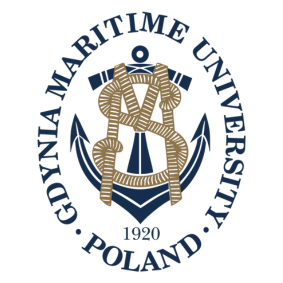University Celebration Day 2022

Speech of the Rector of Gdynia Maritime University
on the occasion of
University Celebration Day 2022
Ladies and Gentlemen!
I am very pleased to welcome you here to Gdynia Maritime University for the ceremonial sitting of the GMU Senate on the occasion of University Celebration Day.
8th December is a special day for maritime education in Poland. On this day 102 years ago, the flag was ceremonially raised on the Maritime School building in Tczew. 10 years later on 8th December 1930, following the relocation of the School to Gdynia, the dedication of the Gdynia State Maritime School's newly constructed building and banner took place.
I am extremely grateful that, as every year, we can once again celebrate this exceptional day in the company of our dear guests, who accepted our invitation for today's inauguration.
Ladies and Gentlemen!
We have three occasions for celebration during the academic year when the Rector can proudly share our successes, point out any failures or misfortune, and determine the directions for further development. These are University Celebration Day on 17th June, the inauguration of the academic year, and University Celebration Day on 8th December.
During the inauguration of the academic year, I gave a speech that lasted 50 minutes, and you weren't sitting comfortably listening to the speech like today, but standing onboard the "Dar Młodzieży, which, after all, is properly profiled, so it was like standing in ski boots on a ski slope. Please accept my apologies for the discomfort. I hope I can speak a little less today.
At this point, I won't mention all our achievements because you will shortly hear about all the awards, decorations, distinctions, and successes connected with the University. I would like to congratulate all those who will be honoured, decorated, and awarded. Remember that your success, no matter how big or small, is a success for our entire academic community.
I would like to thank you all very much for taking the time to be with us today. 8th December is a special celebration. This is the anniversary of the historic beginnings of education at our University.
The date is a bit odd, as usually the academic year begins on 1st October. The Maritime School was established on 17th June 1920. This took place following the decision of the head of state Józef Piłsudski, who ordered the creation of a Polish navy with no distinction between military and merchant roles. Then, on 17th June, Vice Admiral Porębski issued an order for the creation of a Maritime School, and it is on that day we celebrate the establishment of Maritime Education in Poland.
The circumstances at the time, however, meant that instead of arriving for classes at the School, the newly matriculated students went to the front. They took part in a war campaign against Russia and returned to the University only after the end of the war. This took place on 8th December 1920. As a memorial to this event, we hold University Celebration Day on 8th December, and this date is also repeated in the history of the University: 8th December 1930 also saw the inauguration of the new Maritime Schools premises - the building in which we are in now. Today we are celebrating the 102nd anniversary of the inauguration of the academic year - some of us joke that this year our university is 102 years old! In the years to come, we will have more anniversaries – 103rd, 104th, 105th.
Ladies and Gentlemen!
Today's agenda for the sitting of the Senate includes many highlights. In just a moment, we will sign a cooperation agreement with Polish Baltic Shipping, and then we will present State and Ministry decorations, awards and distinctions. In the meantime, we will be treated to a performance by our University Choir. I would like to say that I am particularly proud of our Choir this year as they performed three times with the famous tenor Andrea Bocelli in Warsaw, Krakow and Gdansk. Two weeks ago, a concert took place at the PGE Arena and was attended by 15,000 people, and when a sign appeared above the stage informing the audience that the tenor was accompanied by the Gdynia Maritime University Choir, I was particularly proud and moved, especially given their excellent performance.
Congratulations, Doctor! - I am now addressing the choir conductor, Dr Karol Hill. The Choir has recently celebrated its 20th anniversary, but I hope that, given such tremendous success, the Choir will have not another 20 years, but 120 years of greatness, which I wish you dearly.
Ladies and Gentlemen!
I'm sure you noticed yesterday during the Remembrance Appeal the absence of the Rector and the Deputy Rector.
Together with Professor Dariusz Barbucha, I attended a meeting in London at the headquarters of the International Maritime Organisation with the Secretary-General of the IMO, organised by Minister Marek Gróbarczyk. We made a specific offer there, and I hope that the meeting was a kind of sowing of the grain which will bear fruit in the coming months, years, and maybe in the following terms of office. Allow me to say a little more about this.
For many years now, our University has been ranked at the top of the rankings of international maritime universities. We are consistently in the top ten. This year, the University was ranked in fourth place, and the Maritime University of Szczecin in sixth place, but there were years when we were much higher, as well as when we were a little lower.
We are a member of the International Association of IAMU Maritime Universities, which brings together nearly 70 universities from around the world. These are universities that stand out from other academic institutions by the fact that they have the right to award a master's degree. The training centres that educate future maritime personnel around the world are some tens of thousands. Only a few of them award bachelor of engineering degrees, and master's degrees, as I have already mentioned, are conferred by only 70 higher education institutions. But the powers to award doctoral degrees are truly unique. After the last evaluation, our University was awarded a B+ category in four disciplines, which gives us the right to award doctoral degrees and postdoctoral degrees in these disciplines.
In the International Association of Maritime Institutions, I am a member of the International Executive Board, and therefore the International Executive Council for the Management of the Association, and during the previous term, I was pleased to take up the role of Chair of the Academic Affairs Committee. I can safely say that our prominent position in the maritime environment is recognised by other universities in the world. We hope we shall continue to be a member of these elite bodies for many years to come.
At the end of the last century, the International Maritime Organization founded a World Maritime University in Malmo. It is a University that is funded by the UN budget and managed by the Secretary-General of the International Maritime Organisation, who is currently Mr Kitack Lima of Korea. Over the past 2-3 years, Dalian Maritime University and Shanghai Maritime University have acquired the status of universities associated with the World Maritime University and educated the people of China and the citizens of the countries of the Far East, not in Malmo, but on their own university campuses. Our offer aims to ensure that our University also gains association with the World Maritime University and provides education in areas in which we have extensive knowledge and experience, namely the technical subjects of Marine Engineering and Maritime Technology.
The World Maritime University specialises mainly in political, economic, and social education, in which it trains staff for developing or so-called third-world countries. Our proposal concerned the possibility of training future doctorates in Europe, Africa, and the Middle East, in order not to compete with Chinese universities. At the same time, we have made an offer to allow the citizens of other countries to study with us, and here we are not confined to Eastern Europe - for example, we currently have a lot of students from Ukraine, Belarus, as well as the University of Szczecin. We want to significantly expand the education we provide.
As it so happens, the first two years have passed of this term of office, and for the next two years, I would like to set a course, which I would like to simply call "Internationalisation." I would like our University to become a more international university than it has ever been. Our status permits it. We are recognised and respected in the world, and this is the right time for us to become more dynamic in the international field. Therefore, I appeal to the deans of all four faculties for the preparation of teaching programmes in English in specialisations that can be developed more widely than only among Polish students. This is not a process that will take only a few days. I think it is something that will need many weeks, months, and maybe years to complete.
I would also like to draw attention to the fact that our University has, to date, focused strictly on maritime matters. Before the war, when the Maritime School was founded, the main aim was to educate marine personnel: navigator officers and mechanic officers. After the Second World War, we decided that this was not enough and that we still needed a ground crew. So another faculty was set up to educate the maritime sector, and in 2021, we made another important decision to not only expand our activity at sea and on land within the coastal area, but to focus also on the offshore industry. Specialisations related to this area have since been launched in all four faculties, with a focus on offshore wind energy.
Last year, we began the construction of the Offshore Centre in Gdansk, which is due to be completed in 2023. I hope that when we meet next year for University Celebration Day, I will be able to speak about the opening of the Centre.
The Offshore Centre will be the headquarters of the Maritime Institute, which has been part of the structure of our University for the past three years, but will also be the location of the Offshore Wind Energy Centre, which I established last year and which successfully conducts MBA studies in English.
Ladies and Gentlemen!
At the end of my brief speech, I would like to say that the University is developing dynamically. This is something that brings great satisfaction and of which I am very proud. In just a moment, you will see just how many people have been granted decorations, distinctions, and awards. I think this will be an excellent summary of our achievements this year.
Once again, congratulations to all those who will be honoured today. I wish you all the best!
Thank you very much!

